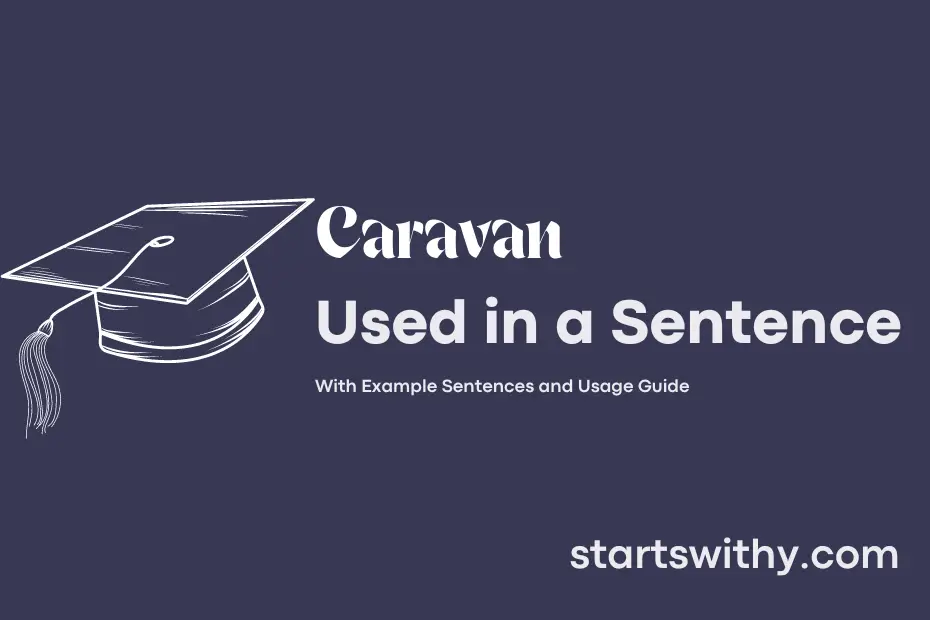Have you ever heard the term “caravan” and wondered what it means? A caravan, in essence, is a group of travelers or vehicles traveling together in single file.
The term “caravan” can refer to a convoy of vehicles, typically seen in desert regions or during long journeys. It can also be used to describe a group of travelers journeying together for safety, companionship, or convenience.
7 Examples Of Caravan Used In a Sentence For Kids
- The caravan is a big group of people traveling together.
- In the caravan, there were many colorful tents.
- The caravan had camels and horses for transportation.
- People in the caravan sang songs and told stories around the campfire.
- Everyone in the caravan was happy and excited for the journey.
- The caravan stopped at a beautiful oasis to rest.
- Children in the caravan played games and made new friends.
14 Sentences with Caravan Examples
- Caravan road trips are a great way to explore different cultures and terrains in India.
- College friends often plan caravan trips during holidays to unwind and create unforgettable memories.
- Planning a budget-friendly caravan trip with friends is a fun way to experience offbeat destinations in India.
- Many college students enjoy the freedom and flexibility of traveling in a caravan.
- Caravan trips allow students to bond with their friends while enjoying the beauty of nature.
- Students can organize a caravan camping trip to escape the hustle and bustle of city life.
- Participating in a caravan rally with fellow students can be an exciting adventure.
- Exploring historical sites and monuments on a caravan tour is a popular choice among college students.
- Students often opt for a caravan trip during college breaks to relax and recharge before the upcoming semester.
- A well-planned caravan journey can give students a taste of sustainable travel in India.
- Many college students prefer the convenience of cooking their meals in a caravan during trips.
- Caravan road trips are a cost-effective way for students to travel responsibly and enjoy nature.
- Joining a caravan club in college can provide students with opportunities to network and make new friends.
- Setting up a makeshift outdoor movie night near the caravan is a popular activity for college students during camping trips.
How To Use Caravan in Sentences?
Caravan is a noun that refers to a group of travelers or vehicles traveling together for safety, especially through deserts or hostile regions.
When using Caravan in a sentence, it is important to keep in mind that it typically refers to a group of people or vehicles moving together as a unit. For example, “The caravan of camels made its way through the desert” describes a group of camels traveling together.
To use Caravan effectively in a sentence, start by identifying the group of travelers or vehicles you want to refer to. Then, use the word Caravan to describe them as a collective unit. You can also provide more context in the sentence to give a clearer picture of the situation, such as the location or purpose of the caravan.
Remember, Caravan is a specific word that conveys the idea of a group traveling together, so use it when you want to emphasize this aspect in your sentence. Practice using Caravan in different contexts to become more comfortable incorporating it into your writing.
Conclusion
In conclusion, sentences with caravan refer to how this term is used in different contexts within the English language. Caravan can mean a group of vehicles traveling together for safety and convenience, or it can refer to a type of recreational vehicle used for camping and travel. These sentences demonstrate the versatility of the word “caravan” and its ability to convey various meanings depending on the context in which it is used.
Whether describing a caravan of camels trekking across the desert or a family enjoying a vacation in their caravan, the term offers a diverse range of applications. Through the examples provided, it is evident that the word “caravan” can evoke images of adventure, leisure, and community, showcasing its importance and relevance in both everyday conversation and literary contexts.



